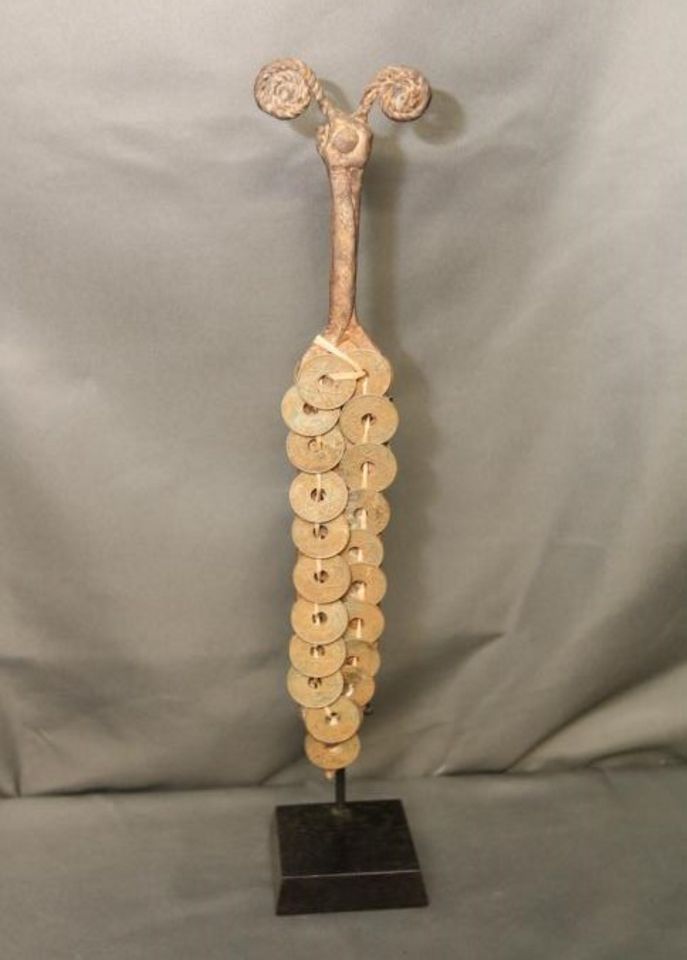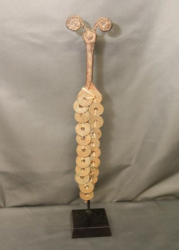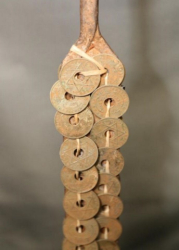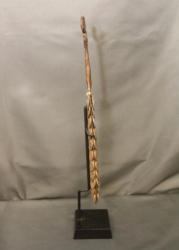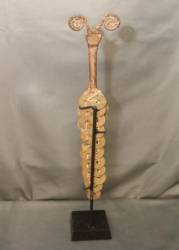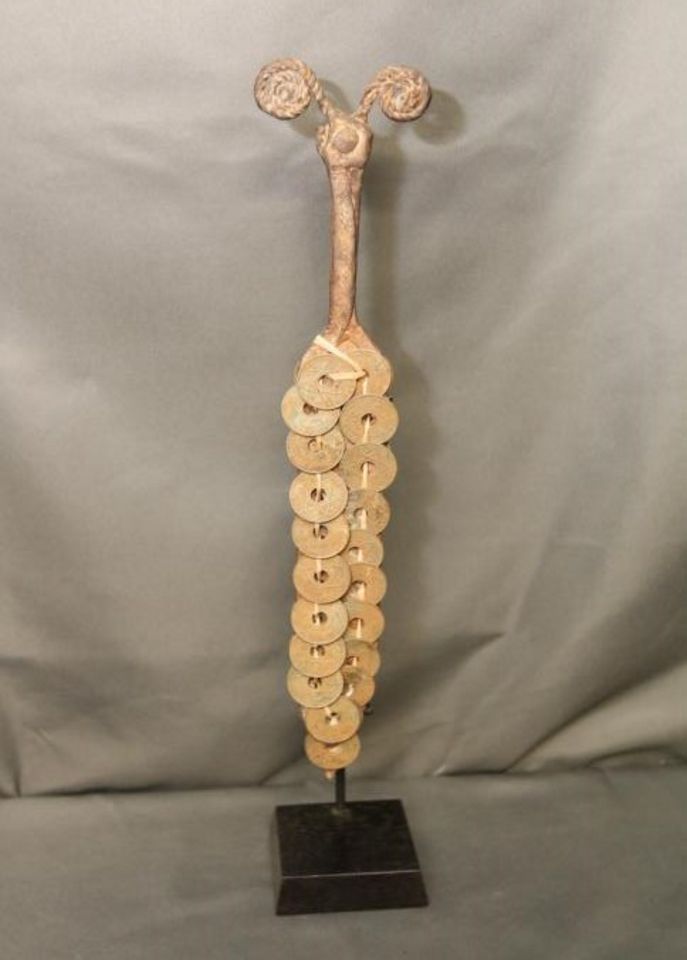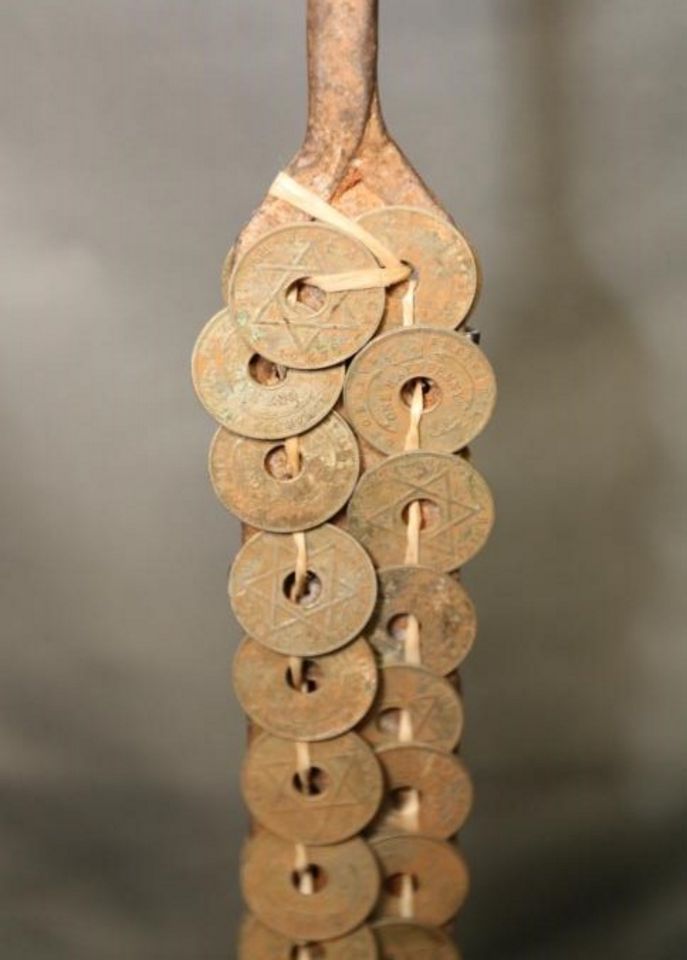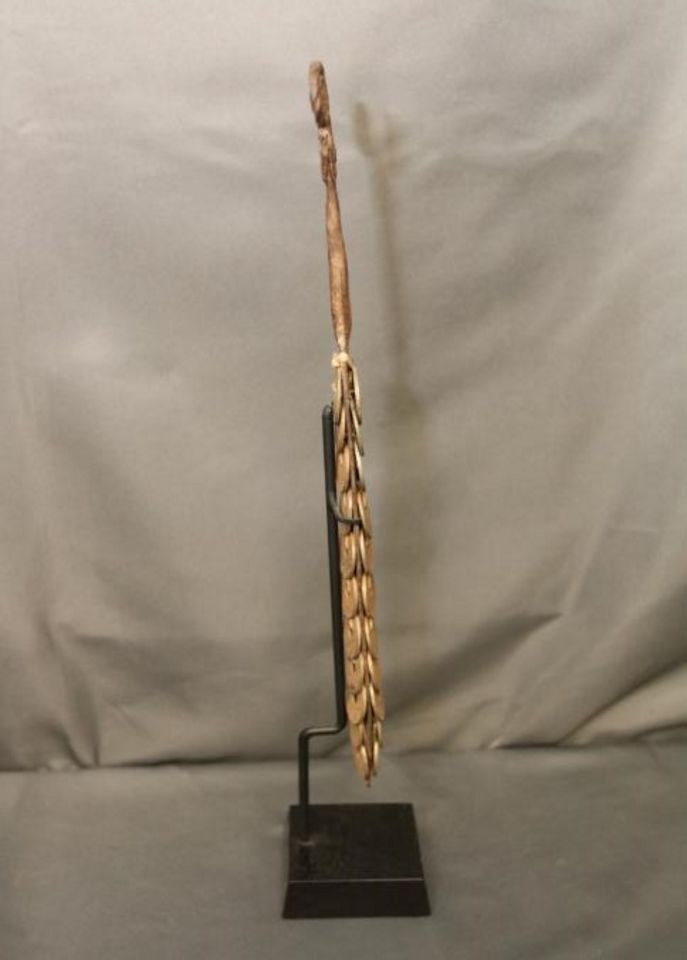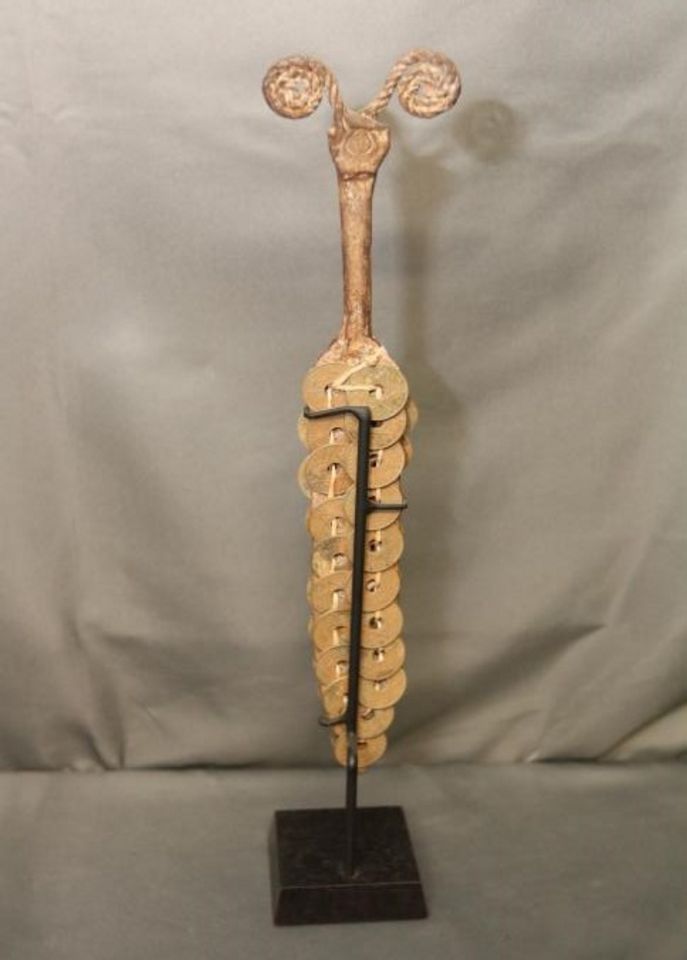Items located in Pleasant Valley, NY. Items include Asafo militia flag, Fante people, Ghana; gong rattle, Chamba people, Cameroon & Nigeria; blacksmith tools, Soninke people, Gambia; ceremonial fetish, Fon people; traditional women's hair pins, Bozo people, Mali; oil lamps, Dogon people, Mali; Cheetem rod currency, Anang people, Nigeria; wedding blanket, Fulani people, Mali or Niger; torque neck ring, Yoruba people, Nigeria; Cache Sexe ring, Kirdipeople, Cameroon & Northeast Nigeria; West African bells, Yoruba People, Nigeria; Duge necklaces, Dogon people, Mali and more.
AFRICAN ART COLLECTION OF MARY SUE AND PAUL PETER ROSEN
Mary Sue and Paul Peter Rosen have collected African art for over thirty years, making nine trips to Africa to study the art in its cultural setting. The Rosens have published three African art books, curated more than ten exhibitions from their collection, and have given public lectures about African art and culture. They have donated art from their collection to various institutions including the Newark Museum, Temple University in Philadelphia, the SMA Fathers African Art Museum in Tenafly, New Jersey, and the African American Research Library in Fort Lauderdale, Florida.
Payment is due by Friday, September 27 at 1PM.
Pickup in Pleasant Valley, NY must be completed by Friday, September 27 at 3PM.
All lots sold as is, where is. There is a 15% Buyers Premium for all lots purchased. Payment methods include cash, MC, Visa, Discover or good check. You can make credit card payment online by going to your Member Area and selecting your invoice.
*NOTE* Shipping is available on all items.
AFRICAN ART COLLECTION OF MARY SUE AND PAUL PETER ROSEN
Mary Sue and Paul Peter Rosen have collected African art for over thirty years, making nine trips to Africa to study the art in its cultural setting. The Rosens have published three African art books, curated more than ten exhibitions from their collection, and have given public lectures about African art and culture. They have donated art from their collection to various institutions including the Newark Museum, Temple University in Philadelphia, the SMA Fathers African Art Museum in Tenafly, New Jersey, and the African American Research Library in Fort Lauderdale, Florida.
Payment is due by Friday, September 27 at 1PM.
Pickup in Pleasant Valley, NY must be completed by Friday, September 27 at 3PM.
All lots sold as is, where is. There is a 15% Buyers Premium for all lots purchased. Payment methods include cash, MC, Visa, Discover or good check. You can make credit card payment online by going to your Member Area and selecting your invoice.
*NOTE* Shipping is available on all items.
Auction Info
Items located in Pleasant Valley, NY. Items include Asafo militia flag, Fante people, Ghana; gong rattle, Chamba people, Cameroon & Nigeria; blacksmith tools, Soninke people, Gambia; ceremonial fetish, Fon people; traditional women's hair pins, Bozo people, Mali; oil lamps, Dogon people, Mali; Cheetem rod currency, Anang people, Nigeria; wedding blanket, Fulani people, Mali or Niger; torque neck ring, Yoruba people, Nigeria; Cache Sexe ring, Kirdipeople, Cameroon & Northeast Nigeria; West African bells, Yoruba People, Nigeria; Duge necklaces, Dogon people, Mali and more.
AFRICAN ART COLLECTION OF MARY SUE AND PAUL PETER ROSEN
Mary Sue and Paul Peter Rosen have collected African art for over thirty years, making nine trips to Africa to study the art in its cultural setting. The Rosens have published three African art books, curated more than ten exhibitions from their collection, and have given public lectures about African art and culture. They have donated art from their collection to various institutions including the Newark Museum, Temple University in Philadelphia, the SMA Fathers African Art Museum in Tenafly, New Jersey, and the African American Research Library in Fort Lauderdale, Florida.
Payment is due by Friday, September 27 at 1PM.
Pickup in Pleasant Valley, NY must be completed by Friday, September 27 at 3PM.
All lots sold as is, where is. There is a 15% Buyers Premium for all lots purchased. Payment methods include cash, MC, Visa, Discover or good check. You can make credit card payment online by going to your Member Area and selecting your invoice.
*NOTE* Shipping is available on all items.
AFRICAN ART COLLECTION OF MARY SUE AND PAUL PETER ROSEN
Mary Sue and Paul Peter Rosen have collected African art for over thirty years, making nine trips to Africa to study the art in its cultural setting. The Rosens have published three African art books, curated more than ten exhibitions from their collection, and have given public lectures about African art and culture. They have donated art from their collection to various institutions including the Newark Museum, Temple University in Philadelphia, the SMA Fathers African Art Museum in Tenafly, New Jersey, and the African American Research Library in Fort Lauderdale, Florida.
Payment is due by Friday, September 27 at 1PM.
Pickup in Pleasant Valley, NY must be completed by Friday, September 27 at 3PM.
All lots sold as is, where is. There is a 15% Buyers Premium for all lots purchased. Payment methods include cash, MC, Visa, Discover or good check. You can make credit card payment online by going to your Member Area and selecting your invoice.
*NOTE* Shipping is available on all items.
Categories:
MONEY SWORD. Yoruba people, Nigeria. When European colonists introduced coins and paper money in Africa around 1900, the local people found inventive ways to carry the currency when their clothing did not have pockets. Coins were often minted with a hole like a washer so that they could be worn or carried on a string. In this instance, holes were punched in a traditional Yoruba ceremonial sword so that coins could be attached to it with string. The sword acted as a bank account and given in important transactions such as bride price. Both sides of the sword are covered with British West African half-penny coins decorated with a six-pointed star and dated 1932-1957. It is noteworthy that coincidentally money swords were also used in China around the same time as a form of dowry payment. On custom base. Hand forged iron, British West African coins, string. H13. 5in.
More Details
MONEY SWORD. Yoruba people, Nigeria. When European colonists introduced coins and paper money in Africa around 1900, the local people found inventive ways to carry the currency when their clothing did not have pockets. Coins were often minted with a hole like a washer so that they could be worn or carried on a string. In this instance, holes were punched in a traditional Yoruba ceremonial sword so that coins could be attached to it with string. The sword acted as a bank account and given in important transactions such as bride price. Both sides of the sword are covered with British West African half-penny coins decorated with a six-pointed star and dated 1932-1957. It is noteworthy that coincidentally money swords were also used in China around the same time as a form of dowry payment. On custom base. Hand forged iron, British West African coins, string. H13. 5in.
High Bid:
$45.00 – ibuythings
Auction Type: One Lot
Quantity: 1
Bidding has closed on this lot

